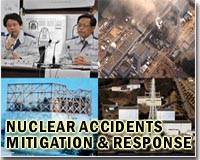 |
Washington (AFP) April 1, 2011 Japan's unfolding nuclear disaster is "much bigger than Chernobyl" and could rewrite the international scale used to measure the severity of atomic accidents, a Russian expert said here Friday. "Chernobyl was a dirty bomb explosion. The next dirty bomb is Fukushima and it will cost much more" in economic and human terms, said Natalia Mironova, a thermodynamic engineer who became a leading anti-nuclear activist in Russia in the wake of the accident at the Soviet-built reactor in Ukraine in 1986. "Fukushima is much bigger than Chernobyl," she said, adding that the Japanese nuclear crisis was likely to eclipse Chernobyl on the seven-point scale used to rate nuclear disasters. A 2005 report by UN bodies including the International Atomic Energy Agency (IAEA) called Chernobyl "the most severe in the history of the nuclear power industry" and ranked it a seven on the International Nuclear Event Scale (INES). But the nuclear crisis in Japan, which was triggered by a massive earthquake and tsunami three weeks ago, could be "even higher" on the INES scale, said Mironova. "Chernobyl was level seven and it had only one reactor and lasted only two weeks. We have now three weeks (at Fukushima) and we have four reactors which we know are in very dangerous situations," she warned. Japan's nuclear safety agency has maintained its rating of the Fukushima accident at four -- the lowest level at which INES considers a nuclear "event" to be an accident -- while a French watchdog has upgraded it to six. Chernobyl's death toll, meanwhile, is hotly debated. The 2005 UN report on Chernobyl said only about 1,000 people received high doses of radiation immediately after the accident and 134 emergency workers died in the year following the disaster of acute radiation sickness. Nearly 20 years after Chernobyl, thyroid cancer had spiked in people who were children at the time of the accident, and "a large fraction" of those cancers were likely due to eating foods contaminated with radioactive iodine after the disaster, the report said. But the UN report said Chernobyl might be responsible in the long term for "up to several thousand fatal cancers," dismissing as "highly exaggerated" claims that "tens or even hundreds of thousands of persons have died as a result of the accident." A report released in 2006 by the environmental group Greenpeace said 60,000 people had died in Russia "because of the Chernobyl accident", which would also cause "nearly 100,000 fatal cancers." Mironova said Chernobyl would likely impact the health of 600 million people around the world over the long-term, or nearly nine times more than were killed in World Wars I and II. She cited a study which found that, by 2015, the nuclear accident will have cost the world $9 trillion. Mironova is touring the United States with fellow anti-nuclear activists Natalia Manzurova, who developed thyroid cancer after working as a "liquidator" at Chernobyl, and Tatiana Muchamedyarova. Their visit was originally planned to mark the 25th anniversary of the Chernobyl meltdown on April 26, 1986, but they rewrote their presentations after the Fukushima nuclear crisis began. Manzurova said Chernobyl and Fukushima showed that nuclear accidents "impact the whole world," not just the country where they occur. Radioactivity from Chernobyl contaminated 77,000 square miles (199,429 square kilometers) of land in Europe and the former Soviet Union, creating "long-term challenges for flora, fauna, water, the environment and human health," former Soviet leader Mikhail Gorbachev wrote in the March issue of the Bulletin of Atomic Scientists. Radiation from Fukushima has been reported in the air, seawater and food, and on Friday the government said groundwater has been found to be contaminated with radioactive fallout. On a screen behind Mironova, a Meteo France computer model showed how radioactive particles have been dispersed from the crippled Fukushima plant in northeastern Japan since the March 11 quake and tsunami. A radioactive cloud hit the Korean peninsula and Siberia within days of the quake and swirled across the Pacific Ocean to reach the United States and Canada a week after the disaster. By Friday, the cloud completely covered the northern hemisphere. "If we did not learn from Chernobyl, we need to use Fukushima to make a real turning point" and move away from nuclear energy, Mironova said.
Share This Article With Planet Earth
Related Links Bringing Order To A World Of Disasters A world of storm and tempest When the Earth Quakes
 Pressure on Japan to widen nuclear evacuation zone
Pressure on Japan to widen nuclear evacuation zoneSendai, Japan (AFP) March 31, 2011 Japan said Thursday there were no immediate plans to widen the exclusion zone around its stricken nuclear plant, hours after the UN atomic watchdog agency voiced its concern over the issue. In Washington, the Pentagon ordered a Marine emergency nuclear response unit to deploy to Japan as a precautionary move and to stand ready to assist in Japan's response to the crisis at the tsunami-hit Fu ... read more |
|
| The content herein, unless otherwise known to be public domain, are Copyright 1995-2010 - SpaceDaily. AFP and UPI Wire Stories are copyright Agence France-Presse and United Press International. ESA Portal Reports are copyright European Space Agency. All NASA sourced material is public domain. Additional copyrights may apply in whole or part to other bona fide parties. Advertising does not imply endorsement,agreement or approval of any opinions, statements or information provided by SpaceDaily on any Web page published or hosted by SpaceDaily. Privacy Statement |